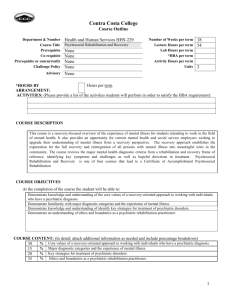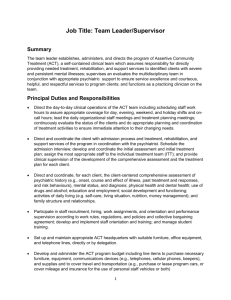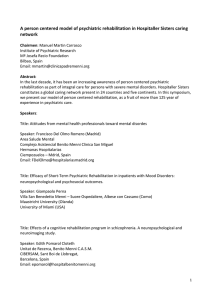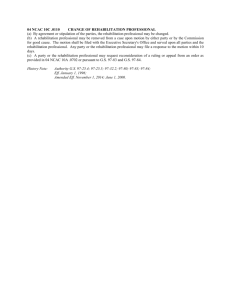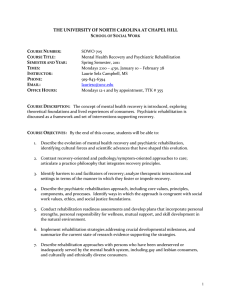THE UNIVERSITY OF NORTH
advertisement
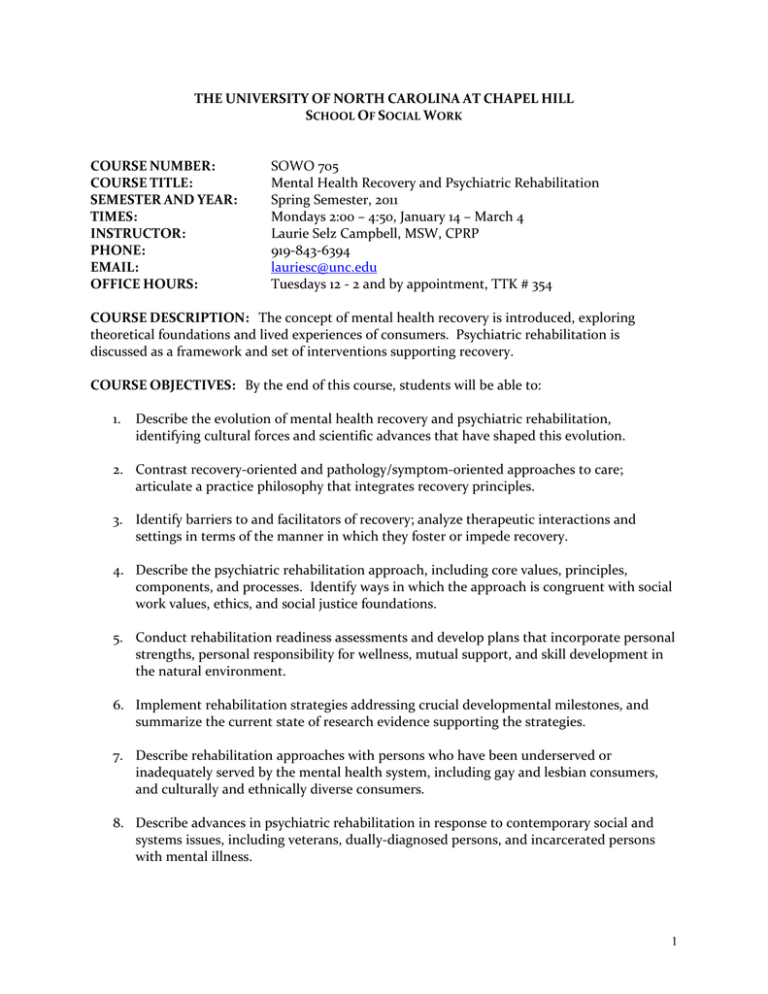
THE UNIVERSITY OF NORTH CAROLINA AT CHAPEL HILL SCHOOL OF SOCIAL WORK COURSE NUMBER: COURSE TITLE: SEMESTER AND YEAR: TIMES: INSTRUCTOR: PHONE: EMAIL: OFFICE HOURS: SOWO 705 Mental Health Recovery and Psychiatric Rehabilitation Spring Semester, 2011 Mondays 2:00 – 4:50, January 14 – March 4 Laurie Selz Campbell, MSW, CPRP 919-843-6394 lauriesc@unc.edu Tuesdays 12 - 2 and by appointment, TTK # 354 COURSE DESCRIPTION: The concept of mental health recovery is introduced, exploring theoretical foundations and lived experiences of consumers. Psychiatric rehabilitation is discussed as a framework and set of interventions supporting recovery. COURSE OBJECTIVES: By the end of this course, students will be able to: 1. Describe the evolution of mental health recovery and psychiatric rehabilitation, identifying cultural forces and scientific advances that have shaped this evolution. 2. Contrast recovery-oriented and pathology/symptom-oriented approaches to care; articulate a practice philosophy that integrates recovery principles. 3. Identify barriers to and facilitators of recovery; analyze therapeutic interactions and settings in terms of the manner in which they foster or impede recovery. 4. Describe the psychiatric rehabilitation approach, including core values, principles, components, and processes. Identify ways in which the approach is congruent with social work values, ethics, and social justice foundations. 5. Conduct rehabilitation readiness assessments and develop plans that incorporate personal strengths, personal responsibility for wellness, mutual support, and skill development in the natural environment. 6. Implement rehabilitation strategies addressing crucial developmental milestones, and summarize the current state of research evidence supporting the strategies. 7. Describe rehabilitation approaches with persons who have been underserved or inadequately served by the mental health system, including gay and lesbian consumers, and culturally and ethnically diverse consumers. 8. Describe advances in psychiatric rehabilitation in response to contemporary social and systems issues, including veterans, dually-diagnosed persons, and incarcerated persons with mental illness. 1 EXPANDED DESCRIPTION: Advances in the understanding and treatment of severe and persistent mental illness encourage us to challenge long-held assumptions about the chronicity of the illness and the potential of mental health consumers to live fulfilled, contributing lives. The concept of mental health recovery and the principles of psychiatric rehabilitation are presented so that students can begin to consider how they might foster the recovery process by supporting consumers to achieve critical life milestones that were interrupted by the onset of mental illness. REQUIRED TEXTS: Corrigan, P., Mueser, K., Bond, G., Drake, R., & Solomon, P. (2008). Principles and practice of psychiatric rehabilitation: An empirical approach. New York, NY: Guilford Press. Corr, C., Dunne, M. Miller, P., Moon, C., & Kapil, M. (2008). Our voices: First-person accounts of schizophrenia. iUniverse Publications. Davidson, L., Rowe, M., Tondora, J., O’Connell, M., & Lawless, M. (2008). A practical guide to recovery-oriented practice: Tools for transforming mental health care. New York, NY: Oxford University Press. Additional readings will be posted on the Sakai website for the course. TEACHING METHODS: I hope that we can all take part in creating a classroom culture characterized by curiosity, exploration, and openness to a variety of perspectives. I expect that we will function as colleagues with much to learn and much to teach. An integral part of the course will be the inclusion of mental health consumers as co-teachers and participants. In addition to the specific knowledge and skills described above, therefore, I hope that you will begin to experience working with mental health consumers as “partners” rather than “patients.” Throughout the course, you will be asked to reflect on the degree to which your practice embodies recovery and rehabilitation principles. ASSIGNMENTS: There will be 2 assignments for the course, described here: Assignment 1: Reflections on Participatory Dialogue: After taking part in the dialogue, please reflect on the following in a paper (about 5 pages): 1. One of the purposes of the dialogue was to invite you to question your assumptions and beliefs (explicit or not) about mental illness and the people who live with it. With this in mind, please reflect on your experience during the dialogue, addressing any of the following as relevant: • What were your feelings in anticipation of the dialogue? What were you looking forward to? Did you feel any reluctance? How was the actual experience similar to/different from what you anticipated? 2 • What, if any, moments were uncomfortable for you? Briefly describe, and consider what the roots of your discomfort might be. How did you respond? Looking back, is there anything you might you do or say differently? • What, if any, moments were surprising to you? Briefly describe, and reflect on the belief or assumption that was challenged. • How would you compare this dialogue to your typical conversations with clients/patients/consumers? You can reflect on content (what we talked about) as well as process (power, self disclosure, others as relevant). • Finally, what do you think worked well in the dialogue? What, if anything, would you change? b. Think about a specific consumer/client with whom you are working (or have worked). Identify an insight shared during the dialogue that encouraged you to think about your work with this individual in a different or new way. What was the insight? What thoughts did it prompt in you? What is at least one action that you might take in your work with your client as a result? c. Finally, think about the context (setting, agency) in which you are working (or have worked). Considering the insights shared during the dialogue about supporting and hindering factors, identify elements within your setting that you believe effectively support the recovery process, and conversely, those elements that may hinder it. You can consider anything that seems relevant, including structure (e.g. caseload, administrative requirements, funding streams), and/or process (e.g. explicit or implicit beliefs about treatment and recovery, nature and quality of supervision, organizational culture). What would be one small change that your agency might make to enhance its focus on recovery? Assignment 2: Psychiatric Rehabilitation Interventions with Select Populations: From the six populations listed in the Course Outline, choose one that is of interest and relevance to you in your practice. You will work in teams and will develop (1) a PowerPoint presentation and (2) a 1-page synopsis to be shared with classmates. You should address the following questions: 1. What are some key demographic characteristics of the group you have chosen? Consider gender, age, socioeconomic status, ethnicity, shared experiences, and other characteristics of relevance. 2. Even though each life journey is unique and individual, can you suggest what might be some key milestones that have been missed or interrupted for your group? What might “recovery” look like for them? Here you can/should incorporate first-person accounts from either your own practice or from online sources. 3. Briefly review the evidence regarding psychiatric rehabilitation interventions with this group. Are there any that might be considered efficacious or promising? What questions and challenges remain? 3 4. If you were to be charged with designing a program for your group, what would be the primary outcomes you would address? What services or program elements might you include? What specific rehabilitation strategies might you implement? More detailed guidelines will be provided for this assignment. GRADING SYSTEM: Scores will be assigned as follows: Reflection Paper 35 points Presentation 45 points Participation 20 points Total 100 points Grades will be assigned as follows: 94 - 100 H 80 - 93 P 70 - 79 L <70 F Note: In considering “participation,” remember that that this class asks you to (a) summarize and reflect on readings and topics during class discussion, and (b) engage actively and personally in questioning and reframing your assumptions and your practice. POLICY ON INCOMPLETES AND LATE ASSIGNMENTS: Assignments are due at the beginning of class on the day noted. You must notify me at least 3 days before a due date if you would like to be granted an extension. Otherwise, I will need to deduct 10% of the assignment’s points per day (including weekends, and including the date on which the assignment was due, if you submit it after the beginning of class). Incompletes may be granted if (a) there are extreme and unforeseeable circumstances that affect your ability to complete the semester’s work, and (b) we discuss in advance a plan and timeline for completing your work. POLICY ON ACADEMIC DISHONESTY: Academic dishonesty (including plagiarism, misrepresenting data, giving or receiving unauthorized assistance, and aiding another student in academic dishonesty) is contrary to the ethics of our profession, unfair to others, and will not be tolerated. All assignments must include the following signed pledge: “I have neither given nor received unauthorized aid in preparing this written work.” You should refer to the APA Style Guide, the SSW Manual, and the SSW Writing Guide for information about properly citing others’ work. POLICY ON ACCOMMODATIONS FOR STUDENTS WITH DISABILITIES: If you have a disability that affects your participation in the course and you wish to receive accommodations, you should contact the University’s Disabilities Services. They will then notify me of the documented disability, and we can meet to design the appropriate accommodations to support your learning. POLICIES ON THE USE OF ELECTRONIC DEVICES IN THE CLASSROOM: I expect that we will all be invested in creating a learning environment of respect and engagement. During class, cell phones should be turned off or transferred to voice mail. In addition, while I welcome the use of laptops in class for taking notes or completing small group tasks, I ask that you use them only for relevant activities – not for checking email or surfing the Web. Your attention is an important sign of respect to your colleagues, and an important part of your learning. 4 COURSE SCHEDULE Date Jan 14 Topics Introduction Evolution of recovery concept Prep for dialogue Jan 21 Jan 28 Readings None No class – Martin Luther King Day Facilitated Dialogue on Recovery with Mental Health Consumer Guests Readings: Corrigan et. al Ch. 2: Stigma & Mental Illness (read for broad themes only) Davidson et. al Ch. 1: The Recovery Movement & Its Implications for Transforming Clinical & Rehabilitative Practice Ch. 2: A Model of Being in Recovery as a Foundation for RecoveryOriented Practice Corr et. al Introduction: How We Wrote the Book Ch. 1: Illness & Recovery Ch. 11: Stigma Onken, S., Craig, C., Ridgway, P., Ralph, R., & Cook, J. (2007). An analysis of the definitions & elements of recovery: A review of the literature. Psychiatric Rehabilitation Journal, 31(1), 9-22. Ralph & Corrigan (posted on Sakai) Ch. 7: Qualitative Studies of Recovery: What Can We Learn From the Person? Feb 4 Recovery-Focused Practice & Systems Transforming practice toward a recovery orientation Recovery & EBP Recovery & professional boundaries Readings: Davidson et al. Ch. 3: The Top 10 Concerns about Recovery Encountered in System Transformation Ch. 4: Practice Standards for Recovery Oriented Care Ch. 5: The Role of the Recovery Guide: A Recovery-Oriented Alternative to Clinical Case Management O'Leary, P., Tsui, M., & Ruch, G. (2013). The boundaries of the social work relationship revisited: Towards a connected, inclusive and dynamic conceptualization. British Journal of Social Work, 43, 135153. Salyers, M., & Tsemberis, S. (2007). ACT & recovery: Integrating evidence-based practice & recovery orientation on assertive community treatment teams. Community Mental Health Journal, 43(6), 619-641. Continued on next page 5 Date Topics Readings We will split up responsibility for the following: Corr et al. Ch. 3: Hospitals, Therapies, & Clubhouses Ch. 4: Mental Health Professionals Ch. 10: The System & Financial Concerns Braslow, J. T. (2013). The manufacture of recovery. Annual Review of Clinical Psychology, Reviews in Advance. Retrieved from http://www.annualreviews.org.libproxy.lib.unc.edu/doi/pdf/10.1146 /annurev-clinpsy-050212-185642 McCranie, A. (2011). Recovery in mental illness: The roots, meanings, and implementations of a “new” services movement. In D. Pilgrim, A. Rogers, & B. Pescosolido (Eds.), The SAGE handbook of mental health and illness. (pp. 471-490). London: SAGE Publications Ltd. Feb 11 Reflection on Recovery Dialogue Due 1. Interventions Promoting Recovery 2. Psychiatric Rehab Overview Emergence & definitions Principles: milestones, wellness, self-help, supports, skills Rehabilitation assessment & plans Basics of skill training Readings: Corrigan et. al Ch. 3: Definition of Psychiatric Rehabilitation Ch. 4: Rehabilitation Assessment Optional Readings: Nemec, P. B., McNamara, S., Walsh, D. (1992). Direct skills teaching. Psychosocial Rehabilitation Journal, 16(1), 13-25. Smith, T. E., Rio, J., Hull, J. W., Hedayat-Harris, A., Goodman, M., & Anthony, D. T. (1998). The rehabilitation readiness determination profile: A needs assessment for adults with severe mental illness. Psychiatric Rehabilitation Journal, 21(4), 380-388. Review of recovery interventions (choose one): Illness Self-Management/Wellness Recovery Action Planning Corrigan et al., Ch. 5: Illness Self-Management (includes some info on WRAP, but can find more at http://www.mentalhealthrecovery.com/) Self Help/Peer Run Services Ralph & Corrigan Ch. 8: Mutual-Help Groups & Recovery: The Influence of Settings on Participants' Experience of Recovery (on Sakai) AND/OR Corrigan et al., Ch. 17: Peer Services & Supports Shared Decision Making (SDM) Substance Abuse & Mental Health Services Administration (2011) Shared decision making in mental health care: Practice, research, & future directions. Retrieved from http://store.samhsa.gov/shin/content//SMA09-4371/SMA094371.pdf ALSO https://www.patdeegan.com/commonground 6 Date Feb 18 Topics Rehabilitation Interventions Addressing Specific Life Milestones Education Employment Living independently Parenting Readings Readings (to be distributed among students): Corrigan et. al Ch. 8: Housing Ch. 9: Employment & Education Corr et al. Ch. 6: Community Living Ch. 7: Education & Employment David, D. H., Styron, T., & Davidson, L. (2011). Supported parenting to meet the needs and concerns of mothers with severe mental illness. American Journal of Psychiatric Rehabilitation, 14(2), 137153. Lucksted, A., Drapalski, A., Calmes, C., Forbes, C., DeForge, B., & Boyd, J. (2011). Ending self-stigma: Pilot evaluation of a new intervention to reduce internalized stigma among people with mental illnesses. Psychiatric Rehabilitation Journal, 35(1), 51-54 (included to foster thinking about the influence of internalized stigma on the rehabilitation process). In addition, we will select areas of interest for students to find 1 additional article to summarize & share Feb 25 Rehabilitation Interventions Addressing Social Functioning, Cognition, Health, Symptom Management, & Family Support Readings (to be distributed among students): Corrigan et. al Ch. 7: Medications & Psychiatric Rehabilitation Ch. 10: Social Functioning Ch. 11: Family Interventions Ch. 12: Psychosis & Cognitive Impairment Ch. 16: Physical Health & Medical Care Corr et al. Ch. 2: Medication Ch. 5: Support Systems: Relationships & Spirituality Ch. 8: Health & Substance Use & Abuse Brown, L. F., Davis, L. W., LaRocco, V. A., & Strasburger, A. (2010). Participant perspectives on mindfulness meditation training for anxiety in schizophrenia. American Journal Of Psychiatric Rehabilitation, 13(3), 224-242 Hutchinson, D. S. (2011). The Recovery Education Center: An Integrated Health Promotion and Wellness Program. Psychiatric Rehabilitation Journal, 34(4), 321-323. Jewell, T. C., Downing, D., & McFarlane, W. R. (2009). Partnering with families: multiple family group psychoeducation for schizophrenia. Journal Of Clinical Psychology, 65(8), 868-878 7 Date Topics Readings Roberts, D. L., & Penn, D. L. (2009). Social cognition and interaction training (SCIT) for outpatients with schizophrenia: A preliminary study. Psychiatry Research, 166(2-3), 141-147. (fascinating, evidence-based, local intervention that shows how social skills are broken into component parts & taught in a group setting) Mar 4 Student Presentations on Interventions for Consumers with Complex Needs: Co-occurring disorders Trauma histories Criminal justice involvement Veterans Immigrants LGBT consumers Resources to be accessed as needed: Corrigan et. al Ch. 13: Managing Criminal Justice Involvement Ch. 14: Trauma & Post-Traumatic Stress Disorder Ch. 15: Dual Diagnosis Ch. 20: Cultural Competence in Psychiatric Rehabilitation Ralph & Corrigan Ch. 9: Daring to Pick Up Pieces in the Puzzle: A Consumer–Survivor Model of Healing From Childhood Sexual Abuse Material on veterans & LGBT consumers to be added Or others of your choosing! 8
